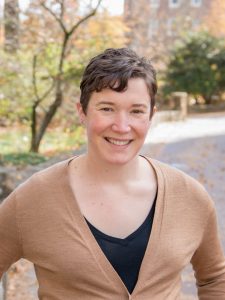
photo by Amy Stern
Amanda Martin received a 2018 Impact Award for her analysis of community and household recovery after Hurricane Floyd. We asked for her initial thoughts on recovery after Florence.
Amanda Martin, a doctoral student in city and regional planning, focuses her research on coastal resilience, recovery from disasters and the importance of community in creating policies related to natural disasters – such as Hurricane Florence.
Martin received a 2018 Impact Award for her community and economic development analysis of buyout decisions after Hurricane Floyd. Her academic adviser, Mai Thi Nguyen, has said, “Helping socially vulnerable communities bounce back better from disasters is the driving focus of Amanda’s research.”
We asked Martin to share her perspective, in the aftermath of Hurricane Florence. We’re also sharing a link to our story on her Impact Award-winning research.
The key lessons of my research that I hope to impart are that post-disaster property buyouts can improve our resilience during disaster recovery, but they will reduce the suffering of communities only if we engage in holistic planning for their intended and unintended impacts. Buyouts help disaster-struck families, especially homeowning households of low or modest means, move out of areas subject to flooding and move on with their lives. No one is allowed to build a home on that land ever again. In the longer view, buyouts can have some community risks, though. Buyout participants must be offered counseling and financial support to ensure that they move into adequate housing which is still affordable to them. Buyout land should become an amenity to neighbors, not an eyesore or dumping ground. The intangible social fabric of a community should be supported by community-based institutions and its heritage documented and preserved.
Finally, Florence makes plain that we will never achieve resilience with the current level of poverty in the state. When families cannot afford to evacuate, we will never have the capacity to bounce back from disaster. We must consider our shared well-being to be a long-term recovery goal.”
